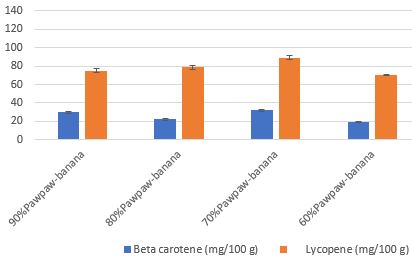Chemical Composition, Physicochemical Properties, and Sensory Attributes of Pawpaw-Banana Mixed Fruit Leather
DOI:
https://doi.org/10.54117/ijnfs.v3i1.34Keywords:
Fruit leather, banana, pawpaw, postharvest losses, antioxidant activities, carotenoid contentsAbstract
Fruits offer nutrient‐dense and satiety choice for a healthy diet; However, they are highly perishable and prone to progressive undesired changes if stored untreated. Post-harvest losses in fruits vary between 15-90% in developing countries. In order to reduce fruits post-harvest losses, it is important to process them into shelf stable products such as fruit leather. Thus, this study assessed the quality attributes of pawpaw-banana mixed fruit leather. The fruit leather was produced by blending varying proportions of banana puree (0 – 40%) with pawpaw puree, and evaluated for chemical and physicochemical properties, carotenoid contents, antioxidant activities, microbiological characteristics and sensory attributes. The vitamin C contents (13.07 mg/100 g) and brix level (12.0 obrix) of the 70%pawpaw leather were the highest among the mixed fruit leather. The beta-carotene and lycopene contents of the mixed fruit leather ranged from 19.78 – 31.88 mg/100g and 70.47- 91.95 mg/100g, respectively. The total phenolic and the FRAP contents of the mixed fruit leather are 0.65 – 0.86 mg/GAE g and 2.34 – 3.84 mmolFe2+/g respectively, while that of the plain pawpaw leather was 0.61 mg/GAE g and 4.11 mmolFe2+/g for total phenolic and the FRAP. The total bacteria count in the fruit leather were within the safe level, while the total coliform and total fungi were not detected. The sensory evaluation results showed that 70%pawpaw leather was highly rated for flavor, taste, texture and overall acceptance. Thus, 70% Pawpaw leather is recommended due to its high nutritional value and sensory attributes.

Downloads
Published
How to Cite
Issue
Section
License
Copyright (c) 2024 Oladoyin Rebecca Ohijeagbon, Jelili Akorede Quadri, Mary Oluwatosin Adesola, Rukayat Adepeju Adediwura, Islamiyat Folashade Bolarinwa

This work is licensed under a Creative Commons Attribution 4.0 International License.
